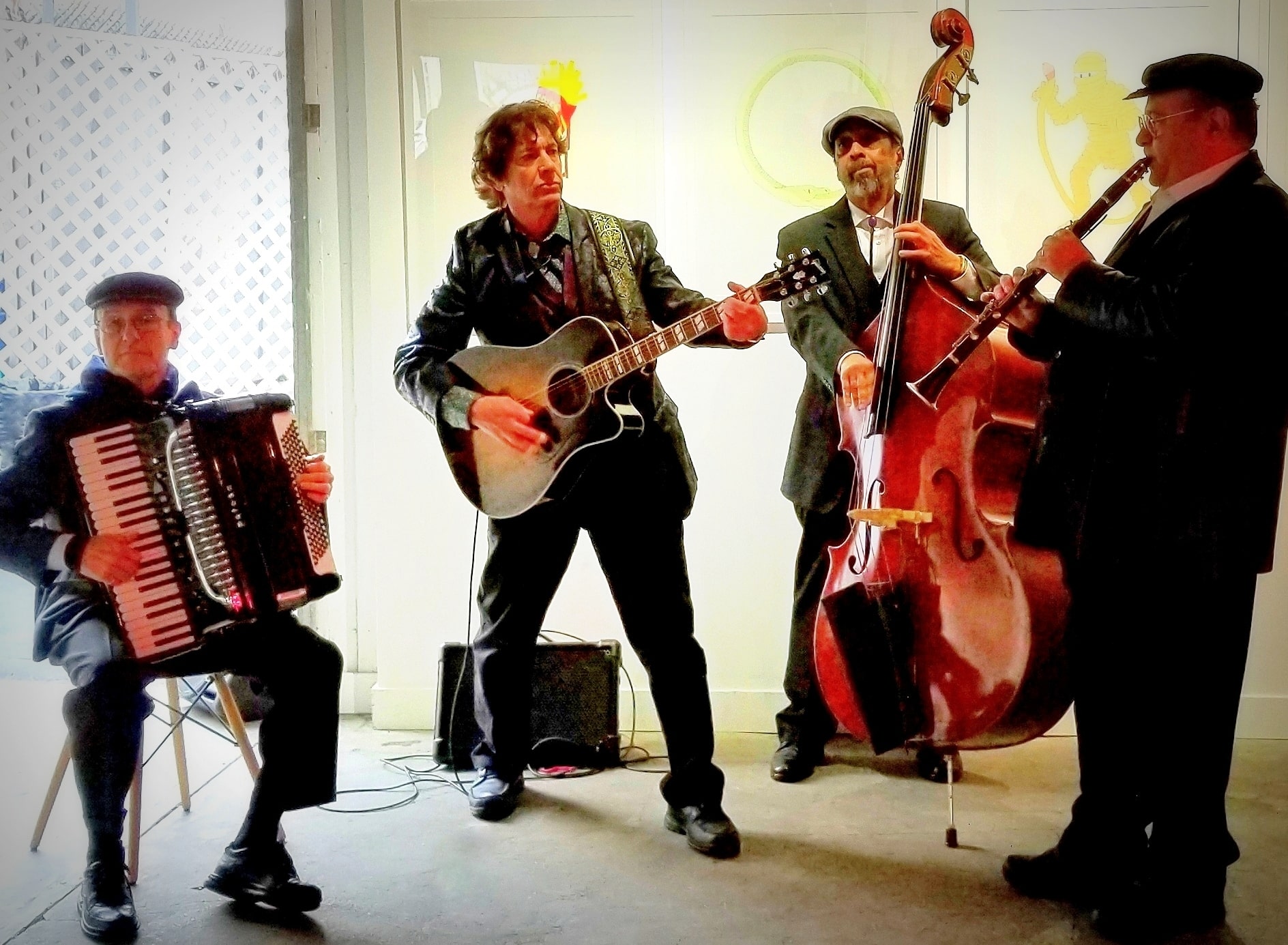 Richárd Bernard,Richard Bernard,Nick Ariondo,Art,Simeon Pillich,Zinovy Goro,Klez
Richárd Bernard,Richard Bernard,Nick Ariondo,Art,Simeon Pillich,Zinovy Goro,Klez Born in Brooklyn, Richárd Bernard grew up listening to the sounds we now associate with klezmer music. His family enjoyed listening to Yiddish and folk music records, including those of Theodore Bikel, Aaron Lebedeff and Leo Fuld. Klezmer music evolved from the music of Eastern European Jews and is inextricably linked to Jewish history and culture. Interestingly, the word “klezmer” is a combination of two Yiddish words: “kley” (meaning “vessel”) and “zemer” (meaning “melody”).
The OY!Stars is Bernard’s Los Angeles-based klezmer band that plays private events and concerts. Bernard’s musical talent has been a part of many TV and film productions. He’s appeared as a guest artist with the Los Angeles Philharmonic Orchestra and the Los Angeles Jewish Symphony. He spoke with the Journal about his life and work before the COVID-19 crisis hit.
Jewish Journal: Can you tell us a little about your musical background?
Richárd Bernard: I grew up listening to music. My mother played mandolin records and Yiddish and folk music. I also went to temple, where I would hear cantorial music. I started playing string instruments at an early age, and it was very natural for me to play those Eastern European sounds. When I was around 10, my family moved to rural Georgia. It was a different world.
JJ: What was it like?
RB: We experienced anti-Semitism and intimidation. We had our car tires loosened, as well as other things. Back then, we were the only Jews in our county. But despite the anti-Semitism, it was easy for me to get musical gigs, and at 13, I was playing in strip clubs and bars. At that time, I played popular music. The other band members would teasingly call me “child prodigy.”
JJ: When did you start to play different instruments?
RB: I started with brass instruments in fourth grade. I played trombone and tuba, and from there, I went on to string instruments. Later, in Georgia, I took private guitar lessons.

JJ: How did your path in music progress from there?
RB: While I was in college, I wrote original songs — singer-songwriter stuff. After college, I worked as an actor and musician in Atlanta while trying to earn a living as an artist. I wanted to work at a particular nightclub that only played Greek music. I became enamored with how Greek music was similar to the music I grew up with. They had a string instrument called a bouzouki that would back up the Greek gypsy performer. I learned a lot from him. After that, I acquired a balalaika (a Russian string instrument) and learned a Russian musical repertoire. It was gestating in me.
JJ: How did things change when you moved to Los Angeles?
RB: I moved to L.A. in 1980. At that time, I was playing the mandolin and the balalaika, and started playing with old-world musicians born in Eastern Europe. LA was a hotbed of klezmer music during this time. There was a klezmer revival going on and a lot of Jews were getting into the music. I was in many bands in LA, where I was the only Yiddish singer. I was also a guitarist. And then I started my own band, the OY!Stars.
JJ: What kind of gigs do you play?
RB: We do concerts, and we’ve done a lot of TV and film work. If something has an Eastern European flavor, I can arrange music for commercials or TV or film. We also do bar mitzvahs and bat mitzvahs. We mostly play in Los Angeles, but we’ve also played around the country. We’ve played in places where they can’t find a klezmer band. We also do outreach, playing for Holocaust survivors and Jewish seniors. We’ve played in nursing homes, Yiddish clubs and [at] events for descendants of Holocaust victims. We’ve performed at weddings, birthday parties and anniversary celebrations. And we get called to play for world music events, like at UCLA and UC Santa Barbara.
JJ: It must be very meaningful playing for people deeply connected to this music.
RB: It is. When you see the look on people’s faces when a song they haven’t heard in years starts playing, and it all comes back to them. Even people with dementia start singing the lyrics or mouthing the words.
JJ: What do you think makes klezmer music special?
RB: I think that when you think about Jewish music, the charm comes from the fact that Ashkenazi Jews took the best of regional music as they passed through different areas in their travels. Middle Eastern music, Romanian, Balkan — all those sounds we think of as klezmer. There’s the excitement of gypsy music and the harmony of Balkan brass band; there’s temple music that has the Sephardic sound and there’s Russian folk music. I think it appeals to people because that unique melding only exists in the klezmer distillation of east and west. It’s like nothing else.
JJ: What is the typical reaction when your band plays?
RB: People usually start dancing — one of two ways. With fast songs, they dance like a punk pogo, jumping up and down. The other is where people have seen a hora done to “Havah Nagilah” in movies and they don’t know the steps, so they’ll just grab arms and dance in a circle. And I tell them, “Circle left!”
Allison Futterman is a writer based in North Carolina.





















 More news and opinions than at a Shabbat dinner, right in your inbox.
More news and opinions than at a Shabbat dinner, right in your inbox.